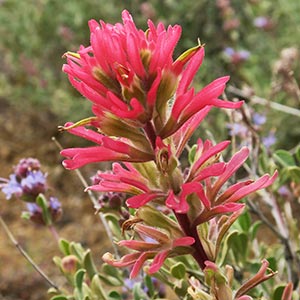Castilleja angustifolia
Castilleja occidentalis
narrow-leaf paintbrush, northwestern Indian paintbrush, northwestern paintbrush, violet desert paintbrush
western Indian paintbrush, western or western yellow paintbrush, western paintbrush
few to many, ascending to erect, branched, especially near base, sometimes unbranched, hairs sparse to dense, spreading to retrorse, long, sometimes short, soft to stiff, usually mixed with short-glandular ones, sometimes viscid.
several to many, erect or ascending, usually short-decumbent at base, unbranched, sometimes glabrous proximally, hairs spreading, long, soft, mixed with medium length to short stipitate-glandular ones only in inflorescence.
brown or purplish, sometimes green, linear to lanceolate or broadly lanceolate, 1.2–7(–7.5) cm, not fleshy, margins plane, sometimes ± wavy, involute or flat, (0–)3–5-lobed, rarely with secondary lobes, apex acuminate to rounded;
lobes spreading, oblong or lanceolate to linear-lanceolate, apex acute to rounded.
green to deep purple, linear-lanceolate to broadly lanceolate (to linear on sterile shoots), 1.5–4(–5.5) cm, not fleshy, margins plane, flat, prominently veined, 0–3(–5)-lobed, apex acute to rounded;
lobes ascending, lanceolate, apex acute.
2.5–20 × 1.5–5 cm;
bracts proximally greenish or dull purplish, distally pink, magenta, pink-purple, reddish pink, pale yellow, pale yellow-orange, pale orange, or white, rarely reddish or orange-red, lanceolate to oblong, 3–5(–9)-lobed, sometimes with secondary lobes;
lobes spreading or ascending, oblanceolate or linear, proximal lobes often much longer than distal, proximal lobes arising below or a little above mid length, apex acute to rounded.
2–7(–10) × 1–3.5 cm;
bracts greenish to pale greenish yellow throughout, often aging dull reddish brown or reddish purple proximally, rarely dull reddish brown throughout, or proximally green, dull reddish brown, or reddish purple, distally greenish white, yellow, or cream, broadly lanceolate to widely oblong to ovate, 0–3(–7)-lobed;
lobes ascending, triangular to lanceolate, medium length, usually arising at or above mid length, rarely just below, central lobe apex obtuse to rounded, others acute.
straight, 18–27(–32) mm;
tube 8–17 mm;
beak usually long-exserted, adaxially green or pink, 8–15 mm;
abaxial lip deep green, reduced, inconspicuous, 1–2.5 mm, 5–20% as long as beak;
teeth incurved to ascending, deep green, 0.5–1.5 mm.
straight, 16–25 mm;
tube 9–15 mm;
teeth and part of abaxial lip sometimes exserted, beak exserted;
beak adaxially green, (2.5–)5–9 mm;
abaxial lip green, reduced, often visible through abaxial cleft, slightly pouched, 1.5–3 mm, 25–50% as long as beak;
teeth incurved to ascending, white, sometimes green, 0.7–2 mm.
proximally green, yellow, brown, or purple, lobes colored as bract lobes, sometimes with a yellow band between proximal and distal parts, 13–25(–28) mm;
abaxial clefts 3–8 mm, adaxial 5–9(–12) mm, clefts 30–50% of calyx length, deeper than laterals, lateral (1–)1.5–4(–5) mm, 10–25% of calyx length;
lobes lanceolate to oblong, abaxials wider than adaxials, apex acute to rounded.
proximally green to purple, distally colored as bracts, 12–20 mm;
abaxial and adaxial clefts 5–9(–10) mm, 40–50% of calyx length, deeper than laterals, lateral 1–3(–4.5) mm, 5–20% of calyx length;
lobes lanceolate to triangular, apex acute, obtuse, or rounded.
= 24, 48.
Castilleja angustifolia
Castilleja occidentalis
Varieties 3 (3 in the flora).
Much confusion exists concerning Castilleja angustifolia and the closely related C. chromosa. Sometimes C. chromosa is treated as a variety of C. angustifolia, using the name C. angustifolia var. dubia. The latter name is used here to represent a different assemblage of plants, not including C. chromosa. At other times, C. chromosa is synonymized completely under C. angustifolia. However, the two species are in most cases easily separable, and where they are sympatric there is little evidence of intergradation. Both C. angustifolia var. dubia and C. chromosa are accepted here. See additional comments under 3b. C. angustifolia var. dubia and 15. C. chromosa.
(Discussion copyrighted by Flora of North America; reprinted with permission.)
Castilleja occidentalis has a wide distribution in the southern Rocky Mountains, a gap in its distribution in Wyoming, and reappears in Montana and the Canadian Rockies. Bract lobing and color vary considerably but without correlation to geography. Although C. occidentalis resembles an alpine form of C. septentrionalis, C. occidentalis is missing in several regions in the distribution of the latter, even when extensive areas of suitable habitat are available, and has a discrete range.
(Discussion copyrighted by Flora of North America; reprinted with permission.)
1. Bracts distally usually pink to pink-purple; s Idaho, sw Montana, se Oregon, nw Wyoming. | var. angustifolia |
1. Bracts distally yellow, yellow-orange, pale orange, white, pink, reddish pink, or magenta; se Idaho, e Nevada, sw South Dakota, w Utah, ec Wyoming. | → 2 |
2. Bracts distally usually yellow to pale orange or white; ec Wyoming, adjacent sw South Dakota. | var. dubia |
2. Bracts distally usually yellow, yellow-orange, white, pink, or reddish pink; se Idaho, e Nevada, w Utah. | var. flavescens |


